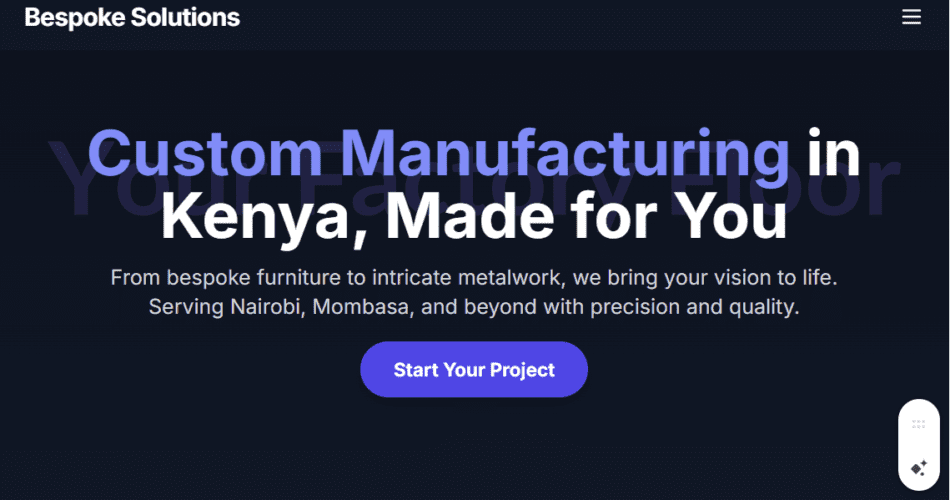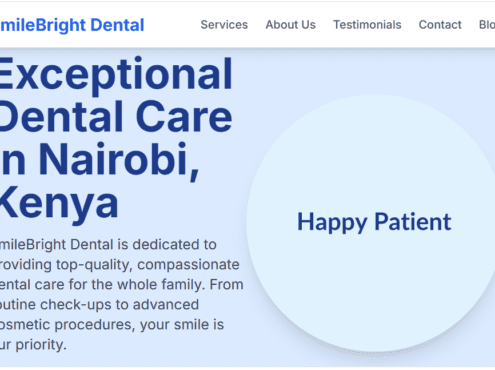SEO for Niche E-commerce Stores in Kenya
-
Delivery Time2 Weeks
-
English levelProfessional
-
LocationUSA, United Kingdom, United Arab Emirates, New York, Nairobi, Kilimani, Kenya, Dubai, CBD Nairobi, Australia
Service Description
The cost of SEO for Niche E-commerce Stores in Kenya is 80000KES per month.Get SEO for Niche E-commerce Stores in Kenya at a price of 30000KES per month at Black Shepherd Technologies.
Shop handcrafted Kenyan leather bags & accessories. Find unique, durable items made by local artisans. Free shipping on orders over KSh 5,000. Browse our collection.
The burgeoning e-commerce landscape in Kenya, with a market size of over $3.5 billion and a projected annual growth rate of nearly 25%, presents a significant opportunity for online stores. However, for niche e-commerce stores, simply having a website isn’t enough. To thrive, these businesses need a robust Search Engine Optimization (SEO) strategy tailored to the unique behaviors of Kenyan consumers. This detailed description will outline a comprehensive approach to SEO for niche e-commerce stores in Kenya, providing a roadmap for increasing online visibility, attracting targeted traffic, and driving sales.
Understanding the Kenyan E-commerce Consumer
A successful SEO strategy begins with a deep understanding of the target audience. Kenyan e-commerce consumers are predominantly mobile-first, with a high rate of smartphone usage. They are also highly attuned to local context and payment methods. Acknowledging and catering to these preferences is paramount. For instance, the use of mobile money platforms like M-Pesa is a dominant form of online payment, and integrating this into your checkout process is a crucial trust signal for both users and search engines.
1. Localized Keyword Research and Optimization
This is the bedrock of any successful SEO campaign. For niche e-commerce in Kenya, a generic keyword strategy will not be effective. The focus must be on localized and high-intent keywords.
Transactional Keywords: Identify the specific phrases Kenyan shoppers use when they are ready to buy. These include terms like “buy
in Nairobi,” “ price Kenya,” or “order online.”Long-Tail Keywords: These are more specific phrases that indicate a higher intent to purchase. For a niche store selling handmade leather goods, examples would be “custom leather wallet Nairobi” or “hand-stitched leather belt Kenya.”
Local Language and Slang: While English is a primary language for business, incorporating common Kenyan English or even Swahili phrases in your content can create a deeper connection with your audience.
Competitor Analysis: Analyze what keywords your competitors are ranking for. This can reveal valuable opportunities and keyword gaps you can exploit to gain a competitive edge.
Once you have your keyword list, integrate these terms naturally into your website’s content. This includes product titles, descriptions, category pages, blog posts, and meta tags.
2. On-Page SEO for Niche Products
On-page SEO involves optimizing the individual pages of your website to improve their ranking. For a niche e-commerce store, this is particularly important for differentiating your products and providing valuable information.
Unique and Detailed Product Descriptions: Avoid using generic, manufacturer-provided descriptions. Instead, craft unique and compelling descriptions that highlight the benefits of your products, address customer pain points, and naturally incorporate your target keywords. Use bullet points and clear formatting to make the content easy to scan on mobile devices.
Optimized Product Images: Use high-quality, compressed images to ensure fast page load times. Crucially, use descriptive alt text that includes keywords. This not only helps with image search but also improves accessibility.
Structured Data Markup (Schema): Implement schema markup for products, reviews, and pricing. This helps search engines understand the context of your content and can lead to rich snippets in search results, making your listings more appealing and increasing click-through rates.
User-Friendly URLs and Navigation: Create logical, keyword-rich URLs for your product and category pages. A clear site structure with a well-organized menu and breadcrumb navigation makes it easy for both users and search engine crawlers to find and understand your content.
3. Technical SEO and Mobile Optimization
Given that a majority of online shopping in Kenya happens on mobile devices, a mobile-first approach is non-negotiable.
Site Speed: Optimize your website’s loading speed. This is a critical ranking factor and essential for a good user experience, especially in a market where internet connectivity can be inconsistent.
Mobile Responsiveness: Ensure your website has a responsive design that adapts seamlessly to different screen sizes. A clunky mobile site will lead to high bounce rates and poor rankings.
XML Sitemaps and SSL Certificates: Create and submit an XML sitemap to Google Search Console to help search engines crawl and index your site efficiently. Use an SSL certificate to secure your website, which is a ranking factor and builds customer trust.
4. Content Marketing and Authority Building
Content is a powerful tool for driving organic traffic, establishing your brand as an authority, and building customer relationships.
Blogging: Create a blog with articles, buying guides, and how-to content that addresses the questions and needs of your target audience. A niche store selling organic beauty products could have blog posts on “The Best Natural Skincare Routine for Kenyan Weather” or “Understanding Ingredients in Your Skincare.”
Leverage Local Relevance: Your content should be locally relevant. This means referencing Kenyan cultural nuances, addressing local challenges, and using case studies or examples that resonate with the Kenyan consumer.
Building Backlinks: Backlinks are a signal of authority. Secure high-quality backlinks from reputable Kenyan blogs, news sites, or industry-specific directories. You can achieve this through guest posting, collaborating with local influencers, or creating compelling content that other websites will want to link to.
5. Leveraging Local SEO
While your store is online, local SEO is still vital for connecting with customers in specific geographic areas.
Google Business Profile: If you have a physical presence or even a hub for deliveries, claim and optimize your Google Business Profile. This helps you appear in local search results and on Google Maps.
Local Directories: List your business on Kenyan business directories to increase your online presence and build valuable citations.
Customer Reviews: Encourage your customers to leave reviews on your website and your Google Business Profile. Positive reviews build trust and are a key factor in local search rankings.
6. Continuous Monitoring and Adaptation
SEO is not a one-time task; it’s an ongoing process.
Use Analytics Tools: Use Google Analytics and Google Search Console to track your website’s performance. Monitor your keyword rankings, organic traffic, and conversion rates.
Track User Behavior: Understand how users are interacting with your site. Are they finding the products they’re looking for? Where are they dropping off? This data will help you refine your strategy.
Stay Updated: The digital landscape is constantly evolving. Stay informed about the latest SEO best practices and algorithm updates from Google to ensure your strategy remains effective.
By implementing these comprehensive SEO strategies, niche e-commerce stores in Kenya can effectively compete in a growing market, attract a loyal customer base, and achieve sustainable long-term success.









